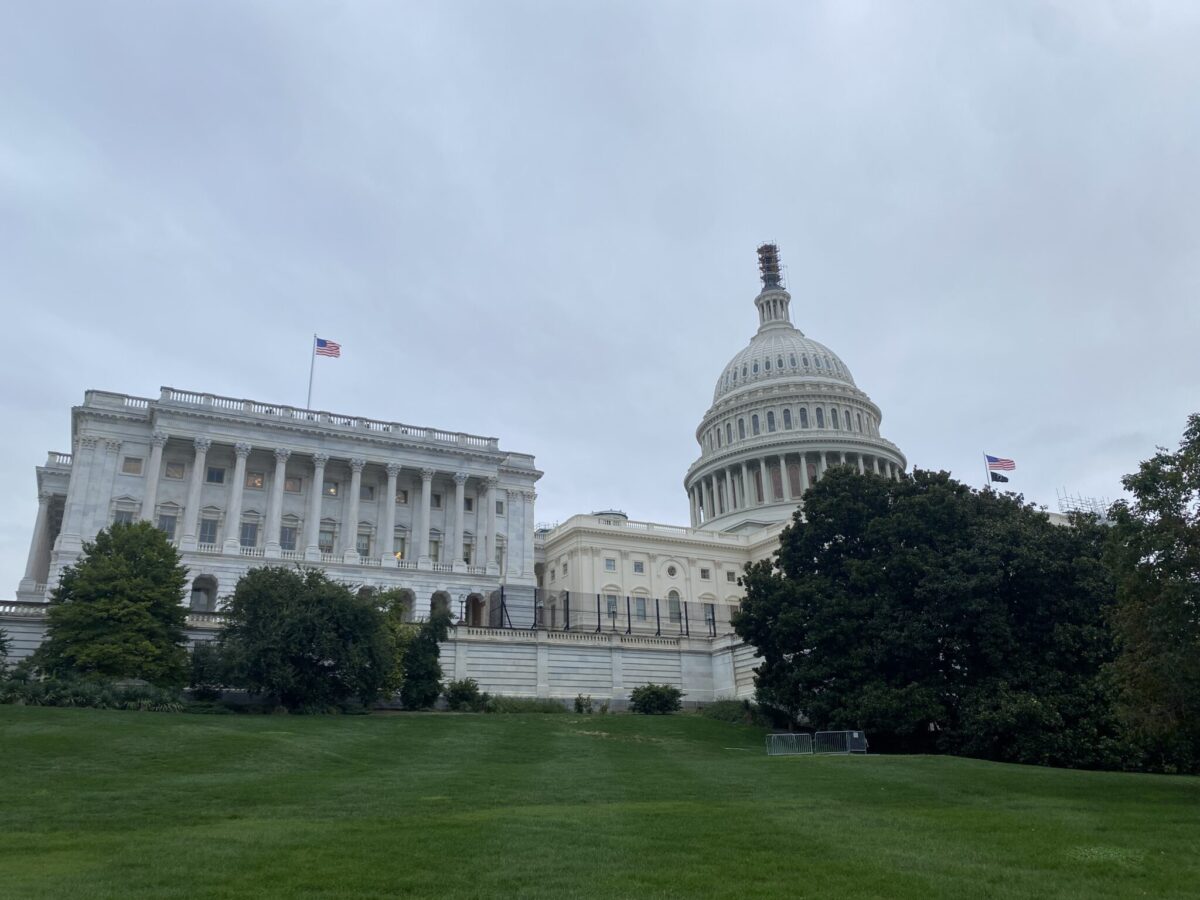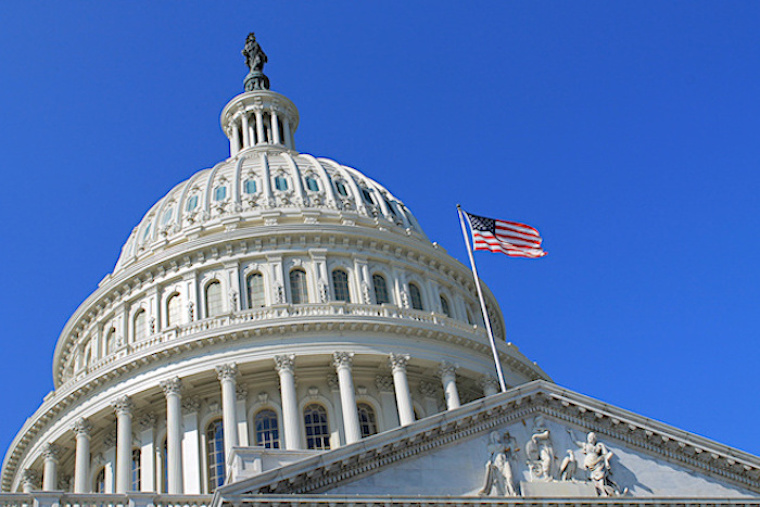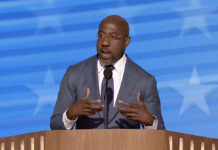
WASHINGTON (GA Recorder) — Republican U.S. senators huddled behind closed doors Thursday, attempting to draft an amendment to the short-term government funding bill that would increase spending on border security and make policy changes.
The provision could help nudge U.S. House Speaker Kevin McCarthy to put the broadly bipartisan measure up for a vote in that chamber, though the California Republican has remained noncommittal.
Congress has just two days before the new fiscal year begins Oct. 1, adding a sense of urgency to negotiations in both chambers of Congress. If a short-term spending bill is not law by then, the federal government would begin a partial shutdown.
Senate approval of the stopgap spending bill that would keep the government running through Nov. 17 is far from a guarantee. Without the consent of all 100 senators, the chamber cannot vote on final passage of the bill before the Saturday midnight deadline.
Senate Appropriations Chair Patty Murray, a Washington state Democrat, said she was open to having discussions on additional disaster relief funding and border security, though she stressed the stopgap spending bill is only meant to keep the government open while Congress works out agreement on the full-year spending bills.
“I know there are colleagues concerned about doing more on border security — something I am willing to continue to discuss,” Murray said. “But time is of absolute essence here and a shutdown would mean the folks who are working at our Southern border would be forced to work without paychecks.”
Thune: ‘A lot of potential options’ on border package
Senate Minority Whip John Thune, a South Dakota Republican, said he and others were discussing how to get border security provisions onto the stopgap spending bill, though he noted there are “a lot of potential options out there.”
Thune said Senate GOP leaders were unlikely to try to remove $6.1 billion in military and humanitarian aid for Ukraine from the short-term spending bill.
“We’re going to have a more fulsome debate on what to do about Ukraine down the road,” Thune said. “And we have a lot of… national security hawks, who care deeply about the message that that sends.”
Kentucky Republican Sen. Rand Paul wrote on X later Thursday that he would allow fast approval of the stopgap spending bill if the Ukraine funding were removed.
“To avoid a government shutdown, I will consent to an expedited vote on a clean CR without Ukraine aid on it,” Paul wrote. “If leadership insists on funding another country’s government at the expense of our own government, all blame rests with their intransigence.”
South Carolina Republican Sen. Lindsey Graham said a handful of Republican senators are discussing both a spending boost and policy changes for the border security amendment.
“We’re trying to come up with a border package that will, you know, move the ball forward in terms of securing the border and trying to find some bipartisan support for it,” Graham said. “I think that’s going to be necessary to get the House on board.”
The group meeting Thursday included Republican Sens. Katie Britt of Alabama, Susan Collins of Maine, John Cornyn of Texas, Graham, Thom Tillis of North Carolina and Thune.
Collins, the top Republican on the spending panel, said it “is imperative that we avert a government shutdown.”
“There’s nothing good that comes from that,” Collins said.
Britt said the group of Republican senators is “working diligently to make something happen.”
“We’re working on a number of options,” she said. “We want to give ourselves the best path possible to keep the government open and shut down the border.”
Votes in the House continue
House Republicans, who have yet to reach a consensus on a short-term government funding bill of their own, were set to vote on some of the dozen full-year spending bills late Thursday night.
Those bills, written below the spending levels McCarthy agreed to in the debt limit deal, have no chance of passing the Democratically controlled Senate or getting President Joe Biden’s support.
The House’s full-year spending bills are also filled with conservative policy provisions that Democrats have repeatedly rebuked.
House Republicans released a short-term government funding proposal earlier this month, though GOP leaders haven’t secured the votes needed to approve the bill. Discussions about how to fund the government in the short term were ongoing Thursday, though without significant progress.
McCarthy said earlier this week the House would probably vote on a stopgap spending bill Friday, but such a vote hasn’t been scheduled.
House Freedom Caucus demands answers
More than 25 members of the House Freedom Caucus sent McCarthy a letter calling on him to answer six questions about funding the government, a signal they aren’t yet convinced they should support a short-term spending bill.
“No Member of Congress can or should be expected to consider supporting a stop-gap funding measure without answers to these reasonable questions,” they wrote. “We remain ready to continue working in good faith with our colleagues across the Republican Conference to advance appropriations; likewise, we expect you to take every step necessary to pass these bills — starting with the four bills now under consideration to fund approximately two-thirds of the federal government.”
The letter was signed by Republican Reps. Scott Perry of Pennsylvania; Barry Moore of Alabama; Paul Gosar of Arizona; Lauren Boebert of Colorado; Byron Donalds, Anna Paulina Luna and Bill Posey of Florida; Andrew Clyde of Georgia; Mary Miller of Illinois; Clay Higgins of Louisiana; Andy Harris of Maryland; Eric Burlison of Missouri; Dan Bishop of North Carolina; Warren Davidson of Ohio; Josh Brecheen of Oklahoma; Jeff Duncan and Ralph Norman of South Carolina; Diana Harshbarger and Andy Ogles of Tennessee; Michael Cloud, Troy Nehls, Chip Roy, Keith Self and Randy Weber of Texas; Bob Good of Virginia; Alexander Mooney of West Virginia; and Tom Tiffany of Wisconsin.
Perry, who chairs the House Freedom Caucus, declined to answer questions about the letter while heading to the House floor for votes Thursday afternoon.
Idaho Republican Rep. Mike Simpson, a senior appropriator, said he didn’t know if GOP leaders were working on a deal on a short-term spending bill, but he said members should vote on all dozen of the annual government funding bills.
Arkansas Republican Rep. Steve Womack, a senior appropriator, said House GOP lawmakers need to be “on record as being for something that prevents a shutdown,” though he admitted party leaders have a difficult task ahead given certain personalities.
“I’m also very empathetic with leadership right now because they are trying to do the near impossible when you think about it, and that is appease people who may be … unappeasable,” Womack said.
Womack, however, said he wasn’t happy GOP leaders used a procedural vote on a rule to pull Ukraine aid out of the Defense spending bill and move it into a stand-alone measure. The decisions came after House lawmakers voted overwhelmingly to reject an amendment that would have removed the funding from the Defense funding bill.
The decision, he said, was intended to secure the votes to pass the Defense spending measure, but it likely violated a long-held House Republican belief that provisions must be supported by a majority of GOP lawmakers to advance on the floor.
“It’s just another movement of the goal posts,” Womack said. “I know that’s a trite saying now because we say it every day, but it’s just one more example of how the conditions under which we are making decisions continue to evolve.”







